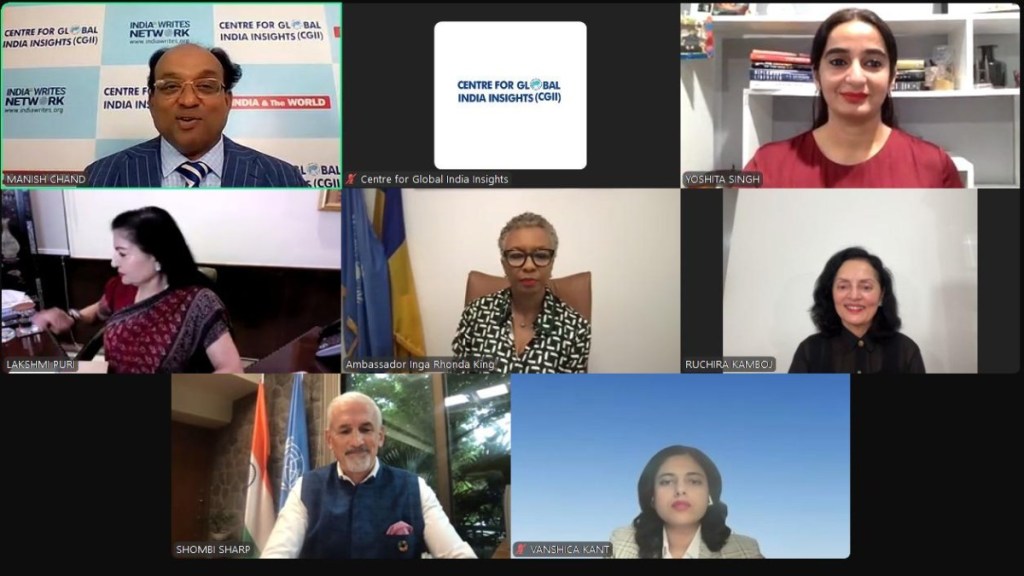Ahead of Prime Minister Narendra Modi’s participation in the United Nations Summit of the Future in New York, eminent diplomats and experts have lauded India’s leadership of the Global South, and advocated accelerating reform of the UN Security Council to make it more inclusive and representative.
“This summit is a once-in-a-generation opportunity to realign global governance structures with today’s geopolitical realities,” said Amb (Retd.) Lakshmi Puri at an online conference titled “The UN Summit of the Future: What It Means for India and the World.”
“The UN Security Council, in particular, has become an anachronism. We have been discussing the need for equitable representation for decades, but no meaningful progress has been made,” said Amb. (Retd.) Puri, former Assistant Secretary-General of the United Nations, on September 17 in New Delhi.
The panel discussion examined the urgent need for UN reforms, the importance of moving from rhetoric to action, and India’s central role in driving global cooperation. Besides Amb. Puri, Amb. (Retd.) Ruchira Kamboj, India’s former Permanent Representative to the UN; Ambassador Inga Rhonda King, Permanent Representative of St. Vincent and the Grenadines to the UN; Shombi Sharp, UN Resident Coordinator in India; Ms. Vanshika Kant, Climate and Social Development Expert at the Asian Development Bank (ADB); and Ms Yoshita Singh, Chief Correspondent at the United Nations for Press Trust of India, participated in the conference. The discussion, moderated by Manish Chand, CEO and Director of CGII, covered a range of critical topics, from the need for real action on global agreements to India’s growing role in international diplomacy.
Amb. Kamboj delivered a sharp critique of the United Nations Security Council (UNSC), calling its current structure outdated and lacking credibility. “With over 3 billion people in India and Africa excluded from permanent membership, the Security Council’s legitimacy is being increasingly questioned,” she stated.
India has long advocated for Security Council reform, seeking a permanent seat alongside other emerging global powers. However, Mrs Kamboj warned that significant reform faces opposition from existing permanent members, making it an uphill battle.
Blueprint for UN Renewal
“The Summit of the Future seeks to kindle hope anew by reinventing and refurbishing the UN and the world order to address all-too-real needs of people cutting across continents and geographies. The summit’s centre-piece is “The Pact of the Future,” a 20-page blueprint for renewal of the UN and streamlining of the international system,” said Manish Chand, CEO, Centre for Global India Insights.
“The future is now. The UN Summit of the Future presents a critical opportunity for world leaders to make tangible reforms and address the most pressing challenges of our time. India, with its growing global influence, will undoubtedly play a pivotal role in ensuring the success of this summit,” said Chand.
Shombi Sharp, UN Resident Coordinator in India, reiterated the need for urgency in Security Council reform, noting that the current structure no longer reflects the power dynamics of the 21st century. He stressed that the summit provides an opportunity for a “calibration” of the global governance system, particularly as the world approaches the 2030 SDG deadline. “The future of the UN depends on its ability to reform. Without inclusive and representative institutions, the UN risks losing its legitimacy,” he said.
Bolstering Multilateralism
Sharp underscored the importance of preserving and improving multilateralism. “Yes, multilateralism is in crisis, but let’s not forget its successes. The UN’s achievements, from the Montreal Protocol to the SDGs, remain crucial. The reforms discussed at the Summit of the Future are necessary for the UN to remain relevant and effective,” he remarked.
One of the central points of discussion was the need to ensure that the Pact for the Future moves beyond well-meaning rhetoric and translates into concrete, enforceable actions. “The Pact for the Future is a visionary document, but the real question is whether it will result in meaningful, enforceable commitments,” said Mrs Kamboj. The risk, as we’ve seen with the Paris Agreement and the SDGs, is that without strong enforcement, these agreements can be diluted by national interests,” she added. She urged global leaders to focus on implementing the pact’s specific actions, especially in areas like international peace, climate change, and digital cooperation.
UN diplomat lauds India’s multilateralism
Ambassador Inga Rhonda King underlined that small island developing states (SIDS) are often marginalized in global discussions, despite making up a significant portion of the UN’s membership. “Small states like ours make up more than 50% of the UN, yet our voices are often drowned out by larger nations. The Summit of the Future is a critical moment to address this imbalance,” said Ambassador King.
She praised India’s leadership in elevating the concerns of the Global South, particularly its role in expanding the G20 to include the African Union and its vaccine diplomacy during the COVID-19 pandemic. “India’s approach to multilateralism is one of partnership, not dominance. Initiatives like the Coalition for Disaster Resilient Infrastructure and the India-UN Development Partnership Fund are examples of how India is contributing to a more inclusive global order,” she added.
Ms. Kant pointed out that financing remains a major challenge for developing countries seeking to address climate change. She highlighted the critical role of multilateral development banks in mobilizing the necessary resources. She also mentioned the skepticism surrounding the outcomes of the Summit of the Future, observing that while the pact is ambitious, there are concerns about whether it will lead to actionable reforms. “The key question is accountability. Without clear timelines and mechanisms, there is a risk that these commitments may not materialize,” she added.
